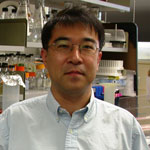
SAN ANTONIO (Nov. 22, 2010) — What prompts normal cells to transform themselves into cancerous cells? Researchers from Texas institutions, including the UT Health Science Center San Antonio, have identified factors in the very first step of the process and reconstituted this first step in the test tube. The latter accomplishment was reported Sunday [Nov. 21] in the top-tier journal Nature Structural & Molecular Biology.
The DNA molecule — the elegant, twin-stranded necklace of life in all cells — gets broken and repaired all the time. Breaks are caused by the body’s metabolic activities such as energy consumption and environmental factors such as exposure to ultraviolet light. Cancer results when the repair response is absent or deficient.
“DNA breaks are considered to be a major instigator of cancer cell development,” said Sang Eun Lee, Ph.D., associate professor of molecular medicine at the UT Health Science Center San Antonio. “When a break is detected, signals are sent to cells that repair is needed.”
The early initiating step of the break repair and signaling “has been quite elusive for some time because the factors were not known,” Dr. Lee said. He was lead author of a paper published recently in EMBO Journal that identified action of a set of enzymes called Mre11 and Exo1.
In the Nature paper the researchers, who included the lab of Tanya Paull, Ph.D., at UT Austin, “repeated the process in a test tube because we now knew about Mre11 and Exo1,” Dr. Lee said.
Dr. Lee’s research is supported by the National Institutes of Health and he is a research scholar of the Leukemia & Lymphoma Society. Collaborating from his laboratory are Eun Yong Shim, Ph.D., assistant professor, and Kihoon Lee, a graduate student.
The University of Texas Health Science Center at San Antonio, one of the country’s leading health sciences universities, ranks in the top 3 percent of all institutions worldwide receiving National Institutes of Health (NIH) funding. Research and other sponsored program activity totaled a record $259 million in fiscal year 2009. The university’s schools of medicine, nursing, dentistry, health professions and graduate biomedical sciences have produced approximately 26,000 graduates. The $739 million operating budget supports eight campuses in San Antonio, Laredo, Harlingen and Edinburg. For more information on the many ways “We make lives better®,” visit www.uthscsa.edu.

